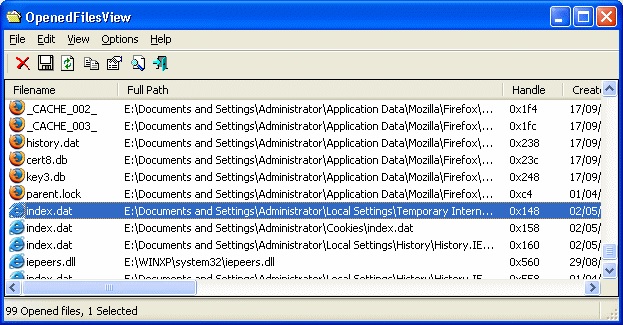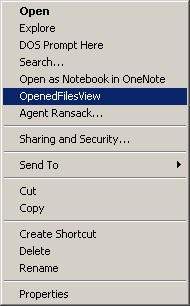Help!
Deanna and I have been running this site since 2008 and lately we're seeing a big increase in
users (and cost) but a decline in percentage of users who donate. Our ad-free and junkware-free
download site only works if everyone chips in to offset the revenue that ads on other sites bring
in. Please donate at the bottom of the page. Every little bit helps. Thank you so much.
Sincerely,
your Older Geeks: Randy and Deanna
Always scroll to the bottom of the page for the main download link.
We don't believe in fake/misleading download buttons and tricks. The link is always in the same place.
OpenedFilesView v1.86 64bit
OpenedFilesView displays the list of all opened files on your system. For each opened file, additional information is displayed: handle value, read/write/delete access, file position, the process that opened the file, and more...
Optionally, you can also close one or more opened files, or close the process that opened these files.
This utility is especially useful if you try to delete/move/open a file and you get one of the following error messages:
Cannot delete [filename]: There has been a sharing violation. The source or destination file may be in use.
Cannot delete [filename]: It is being used by another person or program. Close any programs that might be using the file and try again.
When you get one of these error messages, OpenedFilesView will show you which process lock your file. Closing the right process will solve this problem. optionally, you can also release the file by closing the handle from OpenedFilesView utility. However, be aware that after closing a file in this way, the program that opened the file may become unstable, and even crash.

System Requirements
This utility works properly on Windows 2000, Windows XP, Windows 2003/2008, Windows Vista, Windows 7, Windows 8, Windows 10. On 64-bit systems, you have to use the 64-bit version of OpenedFilesView. Older versions of Windows (NT/9x/ME) are not supported. Also, you must have administrative privilege in order to run this utility.
Known Issue
If you try to run the 64-bit verion of this tool directly from a zip file, you may get the following error message:
The application was unable to start correctly (0xc000007b). Click OK to close the application.
In order to solve this issue, you have to manually extract the content of the zip file into a folder, and then run it from there.
Versions History
Version 1.86:
Fixed OpenedFilesView to send the data to stdout when specifying an empty string (e.g: OpenedFilesView.exe /scomma "" ).
Known Issues
OpenedFilesView cannot close files opened by Windows kernel.
How does it work ?
OpenedFilesView uses the NtQuerySystemInformation API to enumerate all handles in the system. After filtering non-file handles, it uses a temporary device driver - NirSoftOpenedFilesDriver.sys for reading the information about each handle from the kernel memory. This device driver is automatically unloaded from the system when you exit from OpenedFilesView utility.
Using OpenedFilesView
OpenedFilesView doesn't require any installation process or additional DLLs. In order to start using it, just run the executable file - OpenedFilesView.exe
The main window of OpenedFilesView display the list of all files currently opened in your system. In order to refresh the list of opened files, press F5, or alternatively, use the Auto Refresh feature (Options -> Auto Refresh -> Every x seconds) in order to automatically refresh the opened files list every 1 - 5 seconds.
Explorer Context Menu
Starting from version 1.10, you can launch OpenedFilesView directly from Windows Explorer, and view only the handles of the file or folder that you want to inspect.
In order to enable this feature, check the 'Enable Explorer Context Menu' under the Options menu. After you enable this feature, you can right-click on any file or folder on Windows Explorer, and choose the 'OpenedFilesView' item from the menu.
If you run the OpenedFilesView option for a folder, it'll display all opened files inside that folder.
If you run the OpenedFilesView option for a file, it'll display all opened handles for that file.

Other Options
Show Opened Directories: By default, OpenedFilesView only display the opened files. If you also want to view the opened Directories (folders), select this option.
Show Network Files: By default, OpenedFilesView only display the opened files on your local drives. If you also want to view the opened files on remote network drives, select this option.
Sort On Refresh: If this option is selected, new opened files (after refresh) are added to the right position according to the current column sort. If this option is not selected, new opened files are added to the end of the opened files list.
Watch specific application with Drag & Drop
If you want to view only the opened files of specific application instead of the entire system, you can drag the target icon of the toolbar into the window of the desired application. Whenever you want to view all opened files again, simply use the 'Clear File/Process Filters' option.
Command-Line Options
/stext <Filename> Save the list of all opened files into a regular text file.
/stab <Filename> Save the list of all opened files into a tab-delimited text file.
/scomma <Filename> Save the list of all opened files into a comma-delimited text file.
/stabular <Filename> Save the list of all opened files into a tabular text file.
/shtml <Filename> Save the list of all opened files into HTML file (Horizontal).
/sverhtml <Filename> Save the list of all opened files into HTML file (Vertical).
/sxml <Filename> Save the list of all opened files to XML file.
/sort <column> This command-line option can be used with other save options for sorting by the desired column. If you don't specify this option, the list is sorted according to the last sort that you made from the user interface. The <column> parameter can specify the column index (0 for the first column, 1 for the second column, and so on) or the name of the column, like "Filename" and "Created Time". You can specify the '~' prefix character (e.g: "~Created Time") if you want to sort in descending order. You can put multiple /sort in the command-line if you want to sort by multiple columns.
Examples:
OpenedFilesView.exe /shtml "f:\temp\1.html" /sort 2 /sort ~1
OpenedFilesView.exe /shtml "f:\temp\1.html" /sort "~Write Access" /sort "Filename"
/nosort When you specify this command-line option, the list will be saved without any sorting.
/closefile <Filename> Close all handles of the specified filename.
/closefolder <Folder> Close all handles of all files in the specified folder.
/closefile killprocess <Filename> Kill the process that opened the specified filename.
/closefolder killprocess <Folder> Kill the procsses of all files in the specified folder.
/closefile closeprocess <Filename> Close the process that opened the specified filename.
/closefolder closeprocess <Folder> Close the procsses of all files in the specified folder.
/filefilter <Filename> Start OpenedFilesView with file/folder filter. If you specify a file, only the opened handles for the specified file will be displayed. If you specify a folder, all the opened files under the specified folder will be displayed.
For example, if you want to view all opened files under c:\Program Files :
OpenedFilesView.exe /filefilter "C:\Program Files"
If you want to view all opened files with 'index.dat' filename:
OpenedFilesView.exe /filefilter "index.dat"
/wildcardfilter <Filename> Start OpenedFilesView with the specified wildcard filter.
For example, if you want to view only .txt files:
OpenedFilesView.exe /wildcardfilter *.txt
/processfilter <Filename> Start OpenedFilesView with process filter. When you use this filter, only the files opened by the specified process will be displayed. You can specify the full path of the process file, or only the filename without path.
For example:
OpenedFilesView.exe /processfilter "F:\Program Files\Mozilla Firefox\firefox.exe"
OpenedFilesView.exe /processfilter myapp.exe
Translating OpenedFilesView To Another Language
OpenedFilesView allows you to easily translate all menus, dialog-boxes, and other strings to other languages.
In order to do that, follow the instructions below:
Run OpenedFilesView with /savelangfile parameter:
OpenedFilesView.exe /savelangfile
A file named OpenedFilesView_lng.ini will be created in the folder of OpenedFilesView utility.
Open the created language file in Notepad or in any other text editor.
Translate all menus, dialog-boxes, and string entries to the desired language.
After you finish the translation, Run OpenedFilesView, and all translated strings will be loaded from the language file.
If you want to run OpenedFilesView without the translation, simply rename the language file, or move it to another folder.
License
This utility is released as freeware. You are allowed to freely distribute this utility via floppy disk, CD-ROM, Internet, or in any other way, as long as you don't charge anything for this. If you distribute this utility, you must include all files in the distribution package, without any modification !
Disclaimer
The software is provided "AS IS" without any warranty, either expressed or implied, including, but not limited to, the implied warranties of merchantability and fitness for a particular purpose. The author will not be liable for any special, incidental, consequential or indirect damages due to loss of data or any other reason.
Feedback
If you have any problem, suggestion, comment, or you found a bug in my utility, you can send a message to nirsofer@yahoo.com
Click here to visit the author's website.
Continue below for the main download link.
|














 , out of 46 Votes.
, out of 46 Votes.
